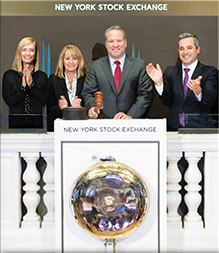Federal Reserve Chairman Jerome Powell stated this week that he does not plan on taking any action to reverse the recent course of accommodative monetary policy until inflation rises to a significant and sustained level. He said that although he does anticipate inflation rising as the economy opens up, he views this as a short term rise in inflation that will likely be temporary. The Fed is currently purchasing $120 billion per month in Treasurys and mortgage backed securities, and reaffirmed they will continue this course for the near future.
With inflation being the main focal point of Fed policy it deserves greater attention as to how it affects the economy and how you can navigate through periods of rising inflation. In this article we will discuss the effects of inflation and what can be done to combat it.
Inflation is generally characterized by rising prices and reduced purchasing power of the dollar. Inflation can be both good and bad depending on the level. Hyperinflation or conversely deflation can be detrimental to the economy, however inflation at a controlled and reasonable level can help the economy grow.
Inflation is usually a sign of a growing economy. It increases wages and helps to stimulate economic growth. Higher inflation also discourages businesses and consumers from saving or cash hording, and causes greater incentive to spend or invest. By contrast, when economic growth begins to slow, there is less demand for the goods sold and the rate of inflation usually subsides.
Now that we know we can anticipate rising inflation, let’s review some of the best ways to counteract it or protect against it.
- For the highly inflation-sensitive fixed income portion of your investments, you should consider allocating a portion of your assets to Treasury inflation-protected securities (TIPS). TIPS are Treasury bonds that are indexed to inflation based upon the rise in the Consumer Price Index (CPI). The yield of TIPS is directly correlated to the rise in inflation, so when inflation is on the rise, so is the principal and coupon payments from these securities.
- Allocate low interest earning savings into the stock market. The theory behind this is that a business’s success is based upon them earning a higher return than their cost of capital, and when businesses sell their goods at increased prices it leads to higher earnings, revenues, and stock price.
- Investing in physical assets like land or real estate may also be wise if the situation presents itself. The value of land or a home generally rises with inflation. Plus, if you are planning on getting a fixed rate mortgage, you may have the opportunity to lock in a low rate now and allow your investments to grow at a potentially higher clip than your mortgage interest.
-
While Fed Chairman Jerome Powell certainly has his eye on raising inflation above 2% for a sustained period of time before raising the Federal Funds rate, there are many steps investors can take to make sure they are guarded against rising inflation. As always, remember to consult a financial professional before making any major decisions, and to see if any of these ideas may be appropriate for you.
Click here to read more of my RetireMint articles. Follow me on Twitter or Linkedin.
This document is for educational and informational purposes only and does not constitute an advertisement or solicitation of any securities or investment services provided Mainstay Capital Management, LLC (“MCM”). This document should not be construed as investment, tax, or legal advice, or a solicitation, or a recommendation to engage in any specific strategy. MCM is an independent investment adviser registered with U.S. Securities and Exchange Commission. MCM specializes in workplace savings plan portfolio management and retirement planning advice for active employees and retirees. This document was prepared by MCM primarily based on data collected and analyzed by MCM. The opinions expressed herein are those of MCM alone and are for background purposes only. MCM does not purport the analysis to be full or complete or to constitute investment advice and should not be relied on. In addition, certain information contained herein or utilized to draw the conclusions contained herein has been provided by, or obtained from, third party sources. While MCM believes that such sources are reliable, it cannot guarantee the accuracy of any such information and does not represent that such information is accurate or complete. All materials and information are provided “as is” without any express or implied warranties by MCM. MCM charges its fee based on a percentage of assets under management, which creates an incentive and conflict of interest to increase assets in that account. Furthermore, MCM has two different fee schedules, and therefore has a conflict of interest when assets or accounts move from the lower fee schedule to the higher fee schedule. Opinions expressed are subject to change without notice and are not intended as investment advice or to predict future performance. Consult your financial professional before making any investment decision. Please see MCM’s Form ADV Part 2A and Form CRS for additional information.







